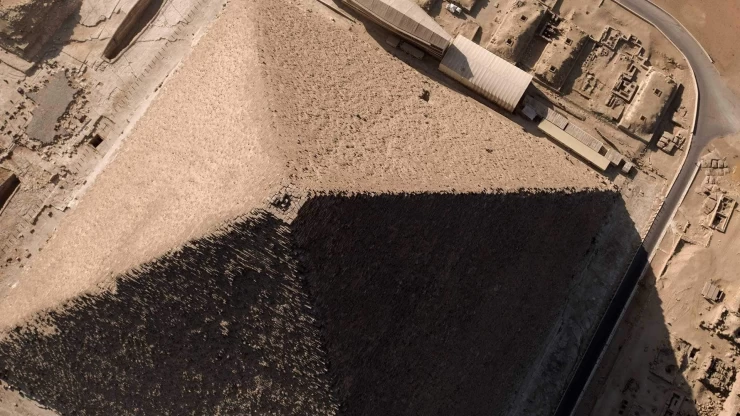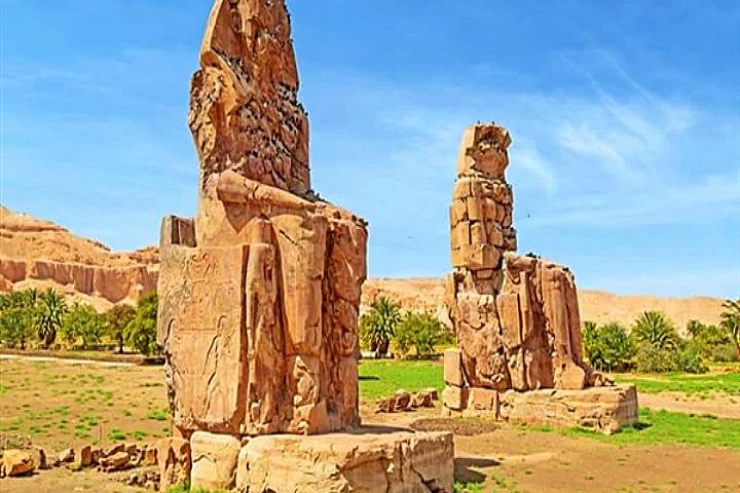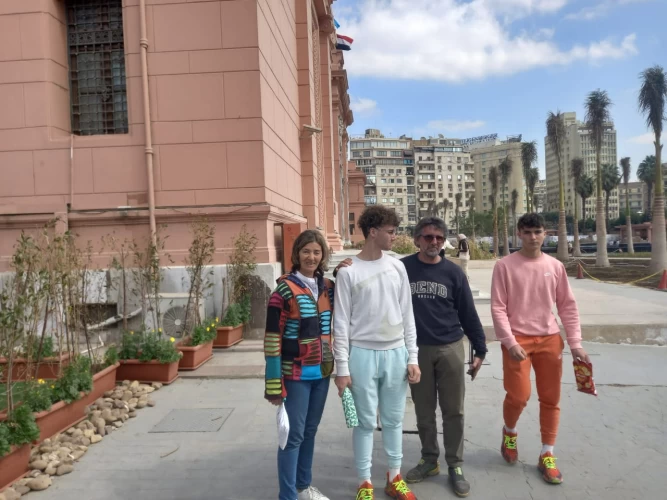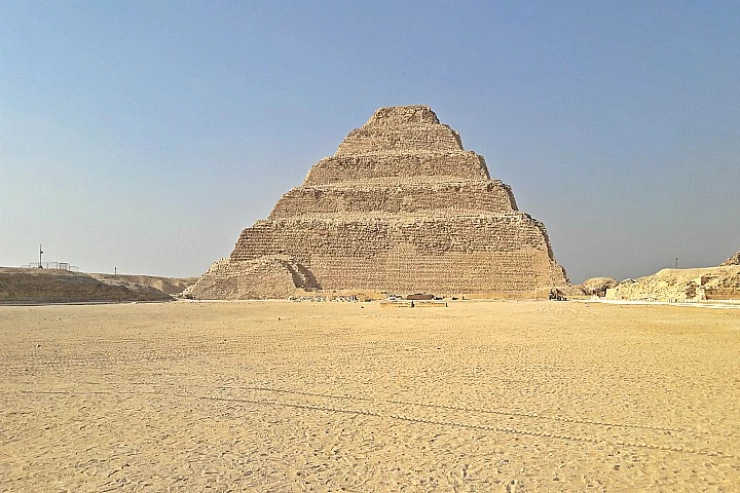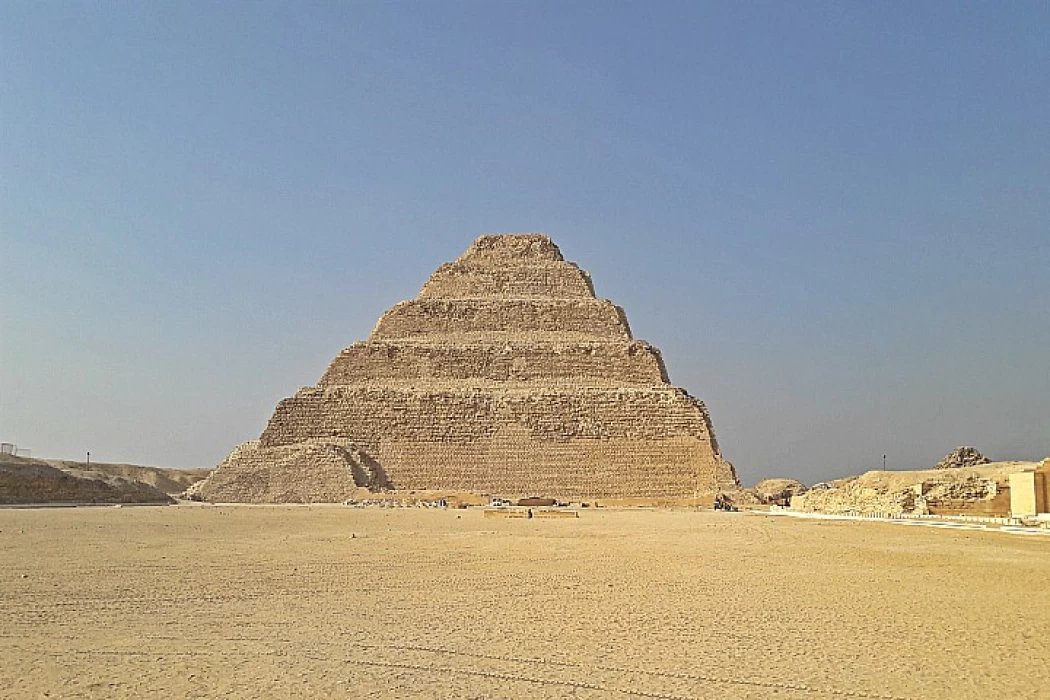
Nécropole de Saqqara
Nécropole de Saqqara
L'énorme monument de Djoser à Saqqarah inspirait l'admiration, même chez les anciens Égyptiens. Lorsqu'un visiteur arrivait pour la première fois dans le Nouvel Empire, il lui semblait que "le ciel était à l'intérieur et le Revenu lui apparaissait". Avec nous, vous pourrez en apprendre davantage sur la nécropole de Saqqara. Elle est célèbre principalement pour avoir été la nécropole royale de l'ancien royaume jusqu'à la troisième dynastie, et pour avoir accueilli la pyramide à degrés de Djoser, la plus ancienne pyramide jamais construite parmi celles attribuées à la civilisation égyptienne.
Saqqara est l'un des vastes cimetières et choses à faire au Caire, il couvre une superficie d'environ 7 km sur 1,5 km environ, une ancienne zone funéraire servant également de nécropole aux rois et aristocrates de l'Égypte ancienne. La caractéristique la plus importante de Saqqara était qu'elle avait de nombreuses pyramides, y compris le célèbre mot pyramide à degrés de Djoser. Parfois appelée pyramide à degrés en raison de sa base rectangulaire (forme). Ainsi qu'un certain nombre de mastabas (mot arabe signifiant `` banc '). Situé à environ 30 km (19 mi) au Sud du Caire actuel.
Pyramide à degrés de Saqqarah
La pyramide à degrés est le monument le plus important à voir lors de plusieurs de nos circuits personnalisés en Égypte. Vous pourrez vous y rendre grâce à de nombreuses excursions en Egypte. Si vous commencez vos forfaits de voyage en Egypte à Louxor ou à Hurghada, assurez-vous de réserver vos excursions d'une journée au Caire pour vous y rendre ou même réserver un vol aller-retour au Caire et profiter d'une variété d'excursions d'une journée au Caire depuis l'aéroport.
La célèbre pyramide de Saqqara datant de la 3ème dynastie (2667-2448 av.J.-C.), quelques centaines d'années avant la grande pyramide, fut le premier complexe jamais construit entièrement en pierre. En outre, il révèle une innovation structurelle importante pour la formation des pyramides de Gizeh et d'autres pyramides ultérieures de la 4e dynastie et plus tard. Car il s'agit de la première pyramide (à gradins) composée de 6 mastabas ou marches et parfois appelée la tombe à degrés en raison de sa base rectangulaire.
La région est un site incontournable si vous réservez l'un des circuits en Égypte ou parmi nos variétés de circuits au départ du Caire.
L'emplacement du cimetière est au Sud d'Abusir et de Dahshur au Sud. Certains scientifiques pensent que le nom (Saqqara) n'est pas dérivé de la divinité funéraire de l'Égypte ancienne, Sokar, mais apparemment, d'une tribu berbère locale appelée (Beni Saqqara). La zone de travail de Dahchour à Gizeh a été utilisée comme nécropole par les citoyens de Memphis à plusieurs reprises, et elle a été nommée site du patrimoine mondial par l'UNESCO en 1979.
Plus de dix autres pyramides et un grand nombre de tombes et de temples funéraires sont dispersés dans la zone de la pyramide à degrés de Djoser. Et l'ensemble du site de la nécropole de Saqqara est un témoin de la grandeur des premières dynasties de l'Égypte ancienne.
Des circuits en Egypte remarquables et sûrs ! Avec nos circuits de Pâques en Égypte 2023, vous ressentirez la grâce de l'esprit antique des Égyptiens en explorant les majestueuses pyramides, les temples, les tombeaux qui hantent votre esprit et votre âme tout en bénéficiant du meilleur service. Des meilleures croisières sur le Nil aux forfaits classiques de visites de sites historiques, Cairo Top Tours propose une gamme d'activités et de vacances d'aventure en Égypte. Outre les sites historiques traditionnels, nous proposons une sélection distinctive de safaris dans le désert égyptien à travers le silence magique et l'attrait des oasis de Siwa, dans le désert égyptien. Choisissez parmi les meilleures offres d'excursions d'une journée en Égypte et choisissez l'une de nos superbes excursions d'une journée au Caire. Nos passionnantes excursions à Louxor et excursions à Assouan vous feront découvrir tous les chefs-d'œuvre historiques de la ville. Notamment la fascinante Vallée des Rois, le fantastique temple de la reine Hatchepsout et les temples uniques d'Abu Simble, le tout accompagné d'un guide expert qui vous expliquera l'histoire de ces incroyables sites.
Si tu veux en savoir plus sur un lieu appelé Gizeh et voir à quoi il ressemble, il existe un site web spécial intitulé Combien de pyramides y a-t-il en Égypte ? Il contient de nombreuses informations et images qui peuvent t'aider à en savoir plus sur Gizeh et son histoire.
To the southwest of Cairo and on the verge of the desert, there exists Saqqara, a design that can boast a lot about ancient Egyptian history, thus making it one of the archaeological sites. This vast expanse is known to be the extension of the burial grounds of Memphis City. Saqqara bears many interesting structures; some of them have managed to survive for more than 4700 years, containing tombs of the pharaohs, nobles, and even sacred pets. The most famous structure in the area is the Djoser Step Pyramid, claimed to be the first real pyramid and considered the largest stone-made structure of its kind within the range.
For this reason, this paper seeks to examine the historical significance of Saqqara, its major landmarks, and the beauty of this ancient city.
A Brief History of Saqqara
The historical importance of Saqqara can be traced back to the Third Dynasty of Egypt around 2650 BCE when Pharaoh Djoser ordered the construction of his pyramid complex. The Step Pyramid, designed by the legendary architect Imhotep, was a transformation in building techniques, giving way from the ordinary mud brick mastabas, which were flat-roof tombs, to decorated pine stone architecture. Over time, Saqqara developed into a large burial area that contained tombs from various dynasties and ages in ancient Egypt's history, which were the Old Kingdom, Middle Kingdom, New Kingdom, and even the later periods.
Like the rest of Memphis and its Necropolis, a UNESCO World Heritage Site, Saqqara is of great importance from the point of view of archaeology and history. Because of the many pyramids, mastabas, temples, and burial complexes present in the site, it also explain the evolution of the Egyptian way of burying their dead, the religious factors involved, and even the development of structures for several centuries.
the Step Pyramid of Djoser: An Architectural Marvel
The most important feature of Saqqara is undoubtedly the Step Pyramid of Djoser—the first ever constructed pyramid and a stunning illustration of Egyptian brilliance. The pyramid has a height of about 62 meters and consists of six steps of diminishing size so that the pyramid takes on its usual stepped shape. The architect of the chaste was the first to use stones in grand structures and set stone slabs that would later develop into the true pyramids of Giza.
Encircling the pyramid itself is a series of courtyards, temples, and other religious structures, most of which were designed to benefit the king in the next world. This includes the South Court, in which visitors may observe the ruins of several ancient shrines and altars used for ceremonial purposes. There is a huge compound wall with 14 gates encircling the complex, one of which was to be used for functional purposes, representing the final resting place of the king with no interference from the outside world.
Within the Step Pyramid structure, there exists a rat’s nest of stairways and rooms. Although the primary burial chamber was taken during antiquity, archaeologists have found astonishing amounts of items and valuables that help understand the culture and practices of the ancient Egyptians.
Saqqara’s Step Pyramid aside, the site is replete with numerous burial places of high-ranking officials, nobles, and members of the royal family. Decorated with finely carved images and wall paintings, the ancient Egyptian tombs illustrate aspects of life in ancient Egypt, including normal activities, religious practices, and iconography.
Tomb of Ti
The Tomb of Ti is one of the more recognized tombs in the Saqqara region. Ti was a high-ranking government official during the Fifth Dynasty. The tomb is famous for its intricate bas reliefs of daily activities in which Ti is shown active, such as tending to crops, going fishing, and making offerings to the deities. These images are not only beautiful but also very helpful in grasping the social, economic, and cultural aspects of the Old Kingdom.
The Mastaba of Mereruka
La Mastaba di Mereruka is another notable recognition within the Saqqara tombs. This is among the most considerable and richly decorated tombs of the necropolis. Mereruka was the visier and a son-in-law of Pharaoh Teti. His tomb contains an incredible number of rooms, a whopping thirty-two chambers, the walls of which are covered with relief images of the highest quality. The events depicted in these images give a detailed picture of many sectors of the ancient Egyptian civilization, ranging from medical practices and religious rites to leisure and domesticity.
The Serapeum: burial sites for the Apis Bulls.
The Serapeum from Saqqara is another interesting aspect that is a structure that was built primarily for burying sacred bulls referred to as the Apis, who took the guise of the god Ptah. The Serapeum consists of a series of underground corridors and galleries containing large stone coffins where the remains of the sacred bulls were interred. This complex is indicative of the Ancient Egyptians’ great love for animals and their unique beliefs about the divinization of certain animals.
New Discoveries at Saqqara: Uncovering Ancient Secrets
Saqqara remains an active site of archaeological research and exploration, and new finds help in addressing previously unknown portions of the ancient Egyptian civilization. Tombs, coffins, and a number of artifacts from different epochs ranging from the Old Kingdom to the Late Period have in recent years been excavated.
The tomb of Wahtye, a priest from the Fifth New Kingdom, monumental as it is, has a very well-preserved tomb bearing fine wall paintings illustrating the life and religious activities of the above-mentioned priest. Another important discovery presents a cache of sarcophagi and anthropoid wooden coffins, most of which are decorated; some were even closed and painted with varnish. These excavated materials help not only to understand the history of the Saqqara area more profoundly but also to reveal the importance of Saqqara as an archaeological site even in these days.
For those who would like to visit Saqqara, this place may be regarded as a temporal adventure as well as a treasure of some of the fantastic historical sites that one can find in Egypt. Allow us to share with you some useful information that would be helpful during your visit:
How To Get There: Saqqara is approximately 30 km from Cairo city center, which is southwest of Cairo, and can be reached by car quite comfortably. A number of tours include a visit to Saqqara, most of which visit other sites as well that are in the vicinity, such as the Giza pyramids and the Dahshur regions.
What to Put On: Since the location of Saqqara is situated in the desert, it's important to wear a suitable dress, and a cap, and protect the skin with sunscreen. Some good walking shoes are advisable since the ground in some places might be rugged.
Guided Tours: Even though it is feasible to visit Saqqara without the aid of a tour, the positive aspect is that a tour does help in improving the experience. Enriched guides help enrich the context and facts, making the ancient history and the importance of the site less than flat.
Other Sites of Interest: You can also make other site visits that are located within reach of Saqqara, for example, the Davis Pyramid, the Bent Pyramid, the Red Pyramid, and Memphis, all of which are located near Saqqara.
Conclusion: Saqqara’s Enduring Legacy
To say that Saqqara is important in ancient Egyptian history is a meager understatement. Its story is multilateral; it is the place where pyramid construction started and has been in use as a sacred burial site for more than three thousand years.
Saqqara comprises some of the most revolutionary structures, from the Step Pyramid of Djoser to the richly decorated niches of its temples, which reveal and preserve the creativity, religious beliefs, and longevity of ancient Egypt.
Saqqara is said to provide the best experience of the past along with the chance to tread like a pharaoh. Saqqara is such a mesmerizing place that almost every history buff and common person desirous of knowing about the ancient wonders of Egypt visits it without fail. It is still breathtaking, mysterious, and enchanting, full of timeless beauty.







